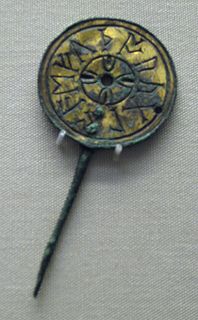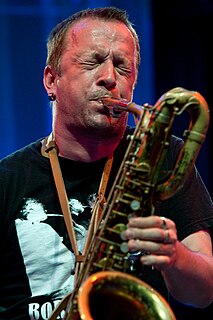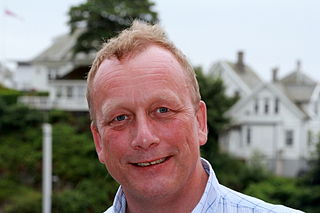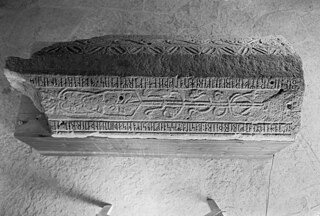RuneScape, sometimes referred to as RuneScape 3, is a fantasy massively multiplayer online role-playing game (MMORPG) developed and published by Jagex, first released in January 2001. RuneScape was originally a browser game built with the Java programming language, but was largely replaced by a standalone C++ client in 2016. The game has had over 300 million accounts created and is recognised by the Guinness World Records as the largest and most-updated free MMORPG.
Suikoden is a role-playing video game series created by Yoshitaka Murayama. The game series is loosely based on the classical Chinese novel Water Margin, whose title is rendered as Suikoden (水滸伝) in Japanese. Each individual game in the series centers on relative themes of politics, corruption, revolution, mystical crystals known as True Runes and the "108 Stars of Destiny"—the 108 protagonists who are loosely interpreted from the source material.

The Gothic alphabet is an alphabet used for writing the Gothic language. Ulfilas developed it in the 4th century AD for the purpose of translating the Bible.

Runes are the letters in a set of related alphabets known as runic alphabets native to the Germanic peoples. Runes were used to write various Germanic languages before they adopted the Latin alphabet, and for specialised purposes thereafter. In addition to representing a sound value, runes can be used to represent the concepts after which they are named (ideographs). Scholars refer to instances of the latter as Begriffsrunen. The Scandinavian variants are also known as futhark or fuþark ; the Anglo-Saxon variant is futhorc or fuþorc.

The Elder Futhark, also known as the Older Futhark, Old Futhark, or Germanic Futhark, is the oldest form of the runic alphabets. It was a writing system used by Germanic peoples for Northwest Germanic dialects in the Migration Period. Inscriptions are found on artifacts including jewelry, amulets, plateware, tools, and weapons, as well as runestones in Scandinavia, from the 2nd to the 10th centuries.

Anglo-Saxon runes are runes used by the early Anglo-Saxons as an alphabet in their writing system. The characters are known collectively as the futhorc from the Old English sound values of the first six runes. The futhorc was a development from the 24-character Elder Futhark. Since the futhorc runes are thought to have first been used in Frisia before the Anglo-Saxon settlement of Britain, they have also been called Anglo-Frisian runes. They were likely to have been used from the 5th century onward, recording Old English and Old Frisian.

Rune Soldier is a Japanese light novel series by Ryo Mizuno, which features the apprentice wizard Louie as the hero. The series takes place on the continent of Alecrast on the world called Forcelia, and is related to the series Sword World RPG. It is a sibling series to Record of Lodoss War, taking place on a continent north of Lodoss Island.

Rune Bratseth is a Norwegian former footballer who played as a sweeper.

Mats Olof Gustafsson is a Swedish free jazz saxophone player.

Per Rune Henriksen is a Norwegian politician for the Labour Party.

There is some evidence that, in addition to being a writing system, runes historically served purposes of magic. This is the case from the earliest epigraphic evidence of the Roman to the Germanic Iron Age, with non-linguistic inscriptions and the alu word. An erilaz appears to have been a person versed in runes, including their magic applications.

A runemaster or runecarver is a specialist in making runestones.

Rune Christiansen is a Norwegian poet and novelist. He is a professor of creative writing at Telemark University College. He won the Brage Prize in 2014 and the Gyldendal lifetime award in 2015.

The Orkesta Runestones are a set of 11th-century runestones engraved in Old Norse with the Younger Futhark alphabet that are located at the church of Orkesta, northeast of Stockholm in Sweden.

Wardruna is a Norwegian music group formed in 2003 by Einar Selvik along with Gaahl and Lindy Fay Hella. They are dedicated to creating musical renditions of Norse cultural and esoteric traditions, and make significant use of Nordic historical and traditional instruments including deer-hide frame drums, flutes, kraviklyra, tagelharpe, mouth harp, goat horn, and lur. Non-traditional instruments and other sources of sound like trees, rocks, water, and torches are also used.

The Seax of Beagnoth is a 10th-century Anglo-Saxon seax. It was found in the inland estuary of the Thames in 1857, and is now at the British Museum in London. It is a prestige weapon, decorated with elaborate patterns of inlaid copper, brass and silver wire. On one side of the blade is the only known complete inscription of the twenty-eight letter Anglo-Saxon runic alphabet, as well as the name "Beagnoth" in runic letters. It is thought that the runic alphabet had a magical function, and that the name Beagnoth is that of either the owner of the weapon or the smith who forged it. Although many Anglo-Saxon and Viking swords and knives have inscriptions in the Latin alphabet on their blades, or have runic inscriptions on the hilt or scabbard, the Seax of Beagnoth is one of only a handful of finds with a runic inscription on its blade.

Raymond Ian Page was a British historian of Anglo-Saxon England and the Viking Age. As a renowned runologist, he specialised in the study of Anglo-Saxon runes.

Morten Qvenild is a Norwegian jazz pianist, band leader, and producer.

Holger Vitus Nødskov Rune is a Danish professional tennis player. He has been ranked as high as world No. 27 in singles by the Association of Tennis Professionals (ATP), which he first achieved on 18 July 2022. Rune has won one ATP Tour singles title and he produced his best Grand Slam performance at the 2022 French Open by reaching the quarterfinals in his main draw debut at the tournament.

The Västergötland Runic Inscription 81 is a 12th century runestone engraved in Old Norse with the Younger Futhark runic alphabet. It is in the form of a grave slab and it was found in the old cemetery of Broddetorp in Falköping Municipality, but it is presently located in the Västergötland Museum in Skara.


















